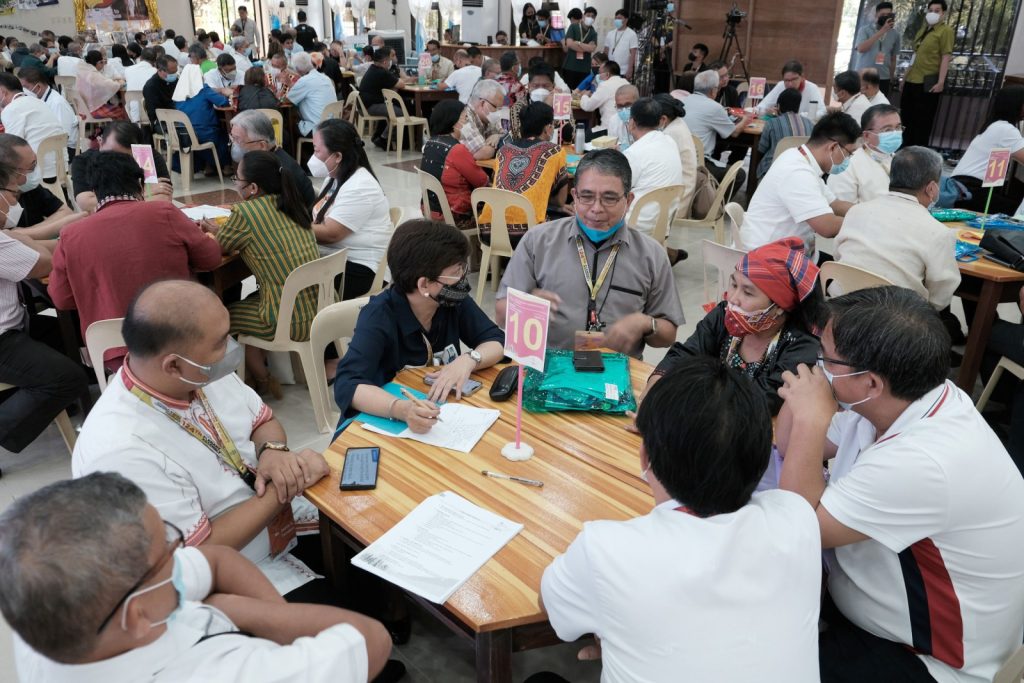The head of the Catholic Bishops’ Conference of the Philippines warned bishops and priests against lording it over the laity instead of “nurturing” them to “grow in the common priesthood of the faithful.”
“While bishops are indeed successors of the apostles, this title might make us forget that we succeed the apostles precisely to lead the Church to grow into a community of missionary disciples, meaning, an apostolic community,” said Bishop Pablo Virgilio David, CBCP president.
The prelate made the reminder in his homily during the closing Mass of the National Synodal Consultation at the Carmelite Missionaries Center of Spirituality in Tagaytay City on Thursday, July 7.
Bishop David urged members of the clergy to take to heart their role as representatives of the “Synodal God in the Body of Christ” and not only ordained into the “ministerial priesthood.”
The meeting, which ran from July 4 to 7, was an occasion for the country’s bishops, priests, and lay workers to discuss various issues affecting the Catholic Church.
As the Philippine Church concluded its celebration of the 500th year of the arrival of Christianity in the country with the “Year of Mission,” Bishop David reminded Church leaders that the mission “is not a mandate only of missionary congregations.”
“It is the business of the whole Church, both local and universal,” he said, adding that, “We can dare say a Church that is not in mission is not a Church.”
He warned that “a Church that practically reduces the priesthood to the ordained ministerial priesthood will never grow into a missionary Church.”
The bishop of Kalookan said that “in that mode of thinking,” which he described as practically reviving that “clericalization of the temple priesthood of the old dispensation,” the lay people “will never imagine themselves as part of what Vatican II calls common priesthood of the faithful.”
“They will tend to remain as followers of the clerics whom they will expect to play the role of ‘Alter Christus,’ as if they had been ordained to substitute for Christ,” said Bishop David.
He said bishops and priests “are supposed to be facilitators of that communion that alone can empower the whole body of the faithful, ordained and lay, for participation in the life of the corporate Christ, and represent him in our shared mission to witness to the liberating good news of the kingdom of God.”
“This will never be realized if our laity are conditioned to think of themselves permanently as followers, or worse, as onlookers,” said Bishop David.


He also warned Church leaders that if they continue to define themselves as “shepherds” and the laity as a “flock,” the latter “will never take part in the Church’s corporate mission of shepherding the last, least, and lost in this world.”
“In that kind of a paradigm, they will clericalize us, put us on pedestals and expect us to evangelize them, to lead them, to bless them, to tell them what to do, because we call ourselves their Christ substitutes,” said the prelate.
The CBCP head stressed that that this kind of thinking can bring disillusionment to the laity, particularly when they hear of “clerical administrative and sexual abuses” and they realize that bishops and priests “are as human as they are.”
“In a clericalistic Church, the laity will never think of themselves as part of a Church that evangelizes, saves, and leads, a Church that is gifted to give, blessed to be a blessing, a community of disciples in mission, like ‘salt of the earth and light of the world,’ or like a little yeast in a mass of dough,” Bishop David said in his homily.
In the wake of the May national elections, political observers have noted that the Catholic Church seemed to have lost its political influence with the victory of President Ferdinand Marcos Jr., son and namesake of the former dictator Ferdinand Marcos, whom the Catholic Church helped overthrow in 1986.
In a comment made for a report on Bloomberg, sociologist of religion Jayeel Cornelio said the Catholic Church is “still behaving very old school.”
“I think their influence lies somewhere other than the national stage,” said Cornelio,” adding that “the national stage isn’t where [the Church] should be concentrating now,” but it “should return to the community level.”


